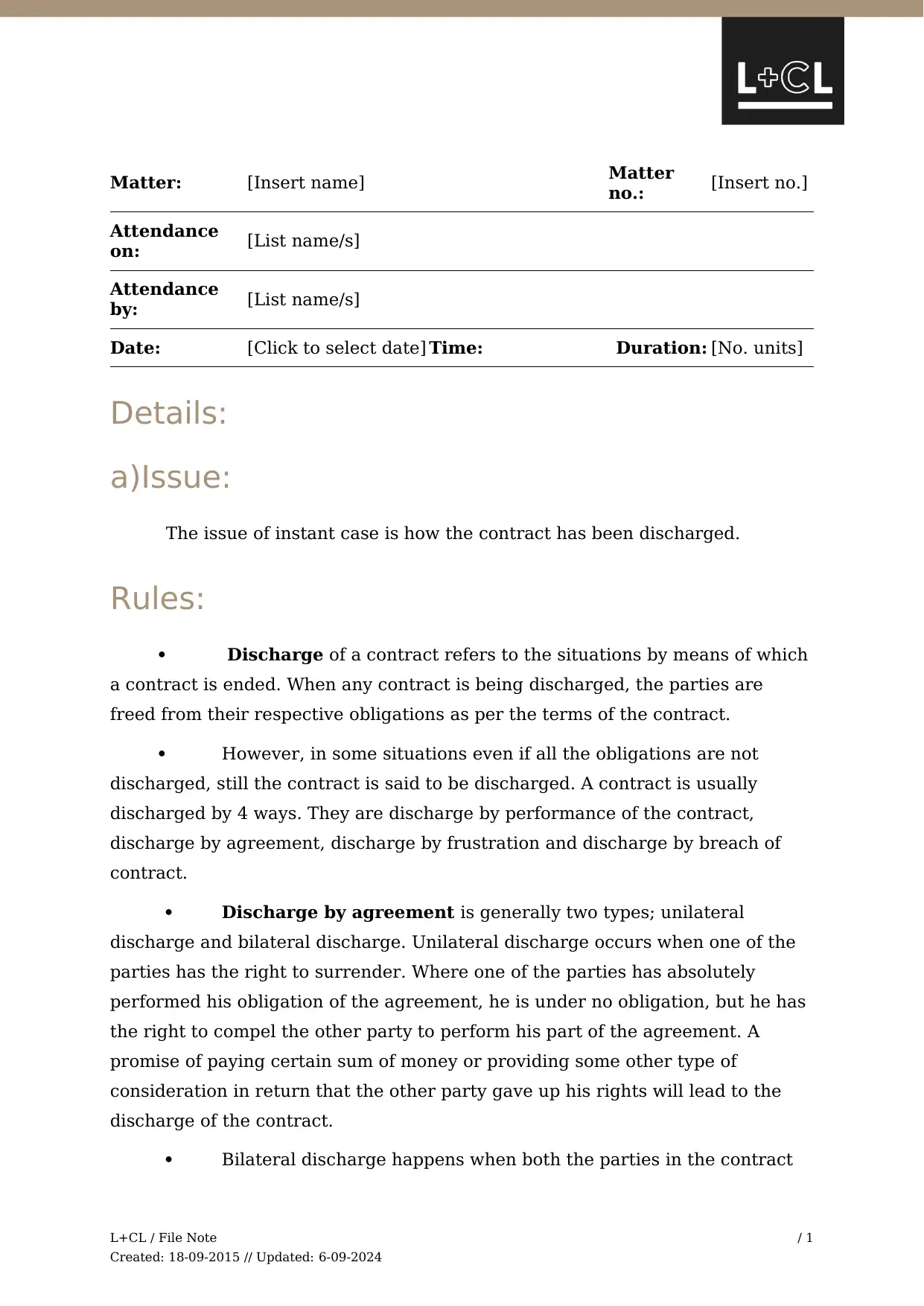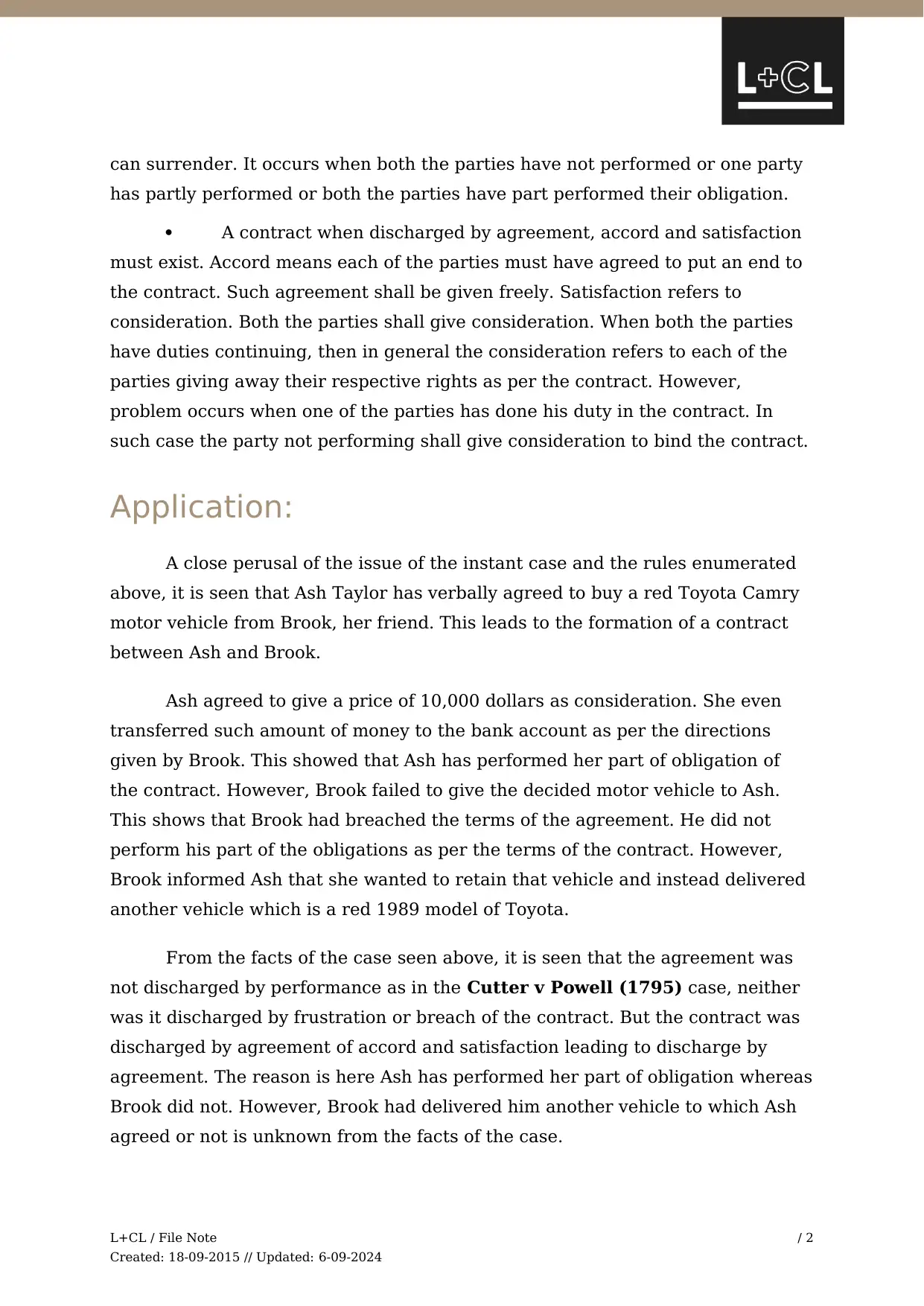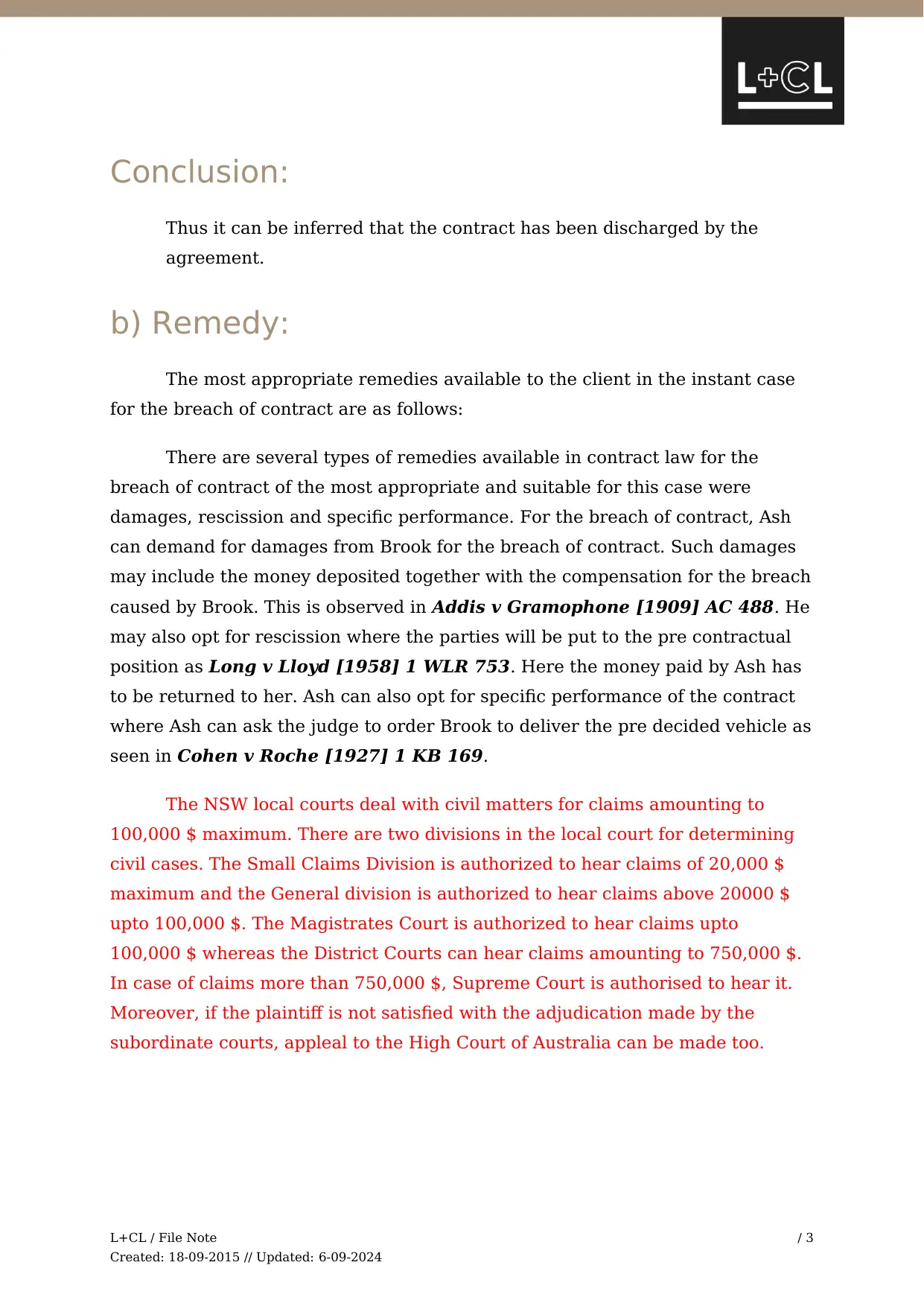Contract Law Analysis: Discharge, Remedies and Court Jurisdiction
VerifiedAdded on 2022/12/20
|3
|1021
|65
Report
AI Summary
This report analyzes a contract law case involving a dispute over the sale of a motor vehicle. The assignment focuses on the issue of contract discharge, specifically examining how the contract was discharged by agreement through accord and satisfaction. It details the rules surrounding contract discharge, including performance, agreement, frustration, and breach, and applies these rules to the case facts. The report also explores the remedies available to the client for breach of contract, such as damages, rescission, and specific performance, and discusses the relevant court jurisdictions for pursuing claims. The analysis references legal precedents and provides a comprehensive overview of the legal principles involved.

Matter: [Insert name] Matter
no.: [Insert no.]
Attendance
on: [List name/s]
Attendance
by: [List name/s]
Date: [Click to select date] Time: Duration: [No. units]
Details:
a)Issue:
The issue of instant case is how the contract has been discharged.
Rules:
Discharge of a contract refers to the situations by means of which
a contract is ended. When any contract is being discharged, the parties are
freed from their respective obligations as per the terms of the contract.
However, in some situations even if all the obligations are not
discharged, still the contract is said to be discharged. A contract is usually
discharged by 4 ways. They are discharge by performance of the contract,
discharge by agreement, discharge by frustration and discharge by breach of
contract.
Discharge by agreement is generally two types; unilateral
discharge and bilateral discharge. Unilateral discharge occurs when one of the
parties has the right to surrender. Where one of the parties has absolutely
performed his obligation of the agreement, he is under no obligation, but he has
the right to compel the other party to perform his part of the agreement. A
promise of paying certain sum of money or providing some other type of
consideration in return that the other party gave up his rights will lead to the
discharge of the contract.
Bilateral discharge happens when both the parties in the contract
L+CL / File Note / 1
Created: 18-09-2015 // Updated: 6-09-2024
no.: [Insert no.]
Attendance
on: [List name/s]
Attendance
by: [List name/s]
Date: [Click to select date] Time: Duration: [No. units]
Details:
a)Issue:
The issue of instant case is how the contract has been discharged.
Rules:
Discharge of a contract refers to the situations by means of which
a contract is ended. When any contract is being discharged, the parties are
freed from their respective obligations as per the terms of the contract.
However, in some situations even if all the obligations are not
discharged, still the contract is said to be discharged. A contract is usually
discharged by 4 ways. They are discharge by performance of the contract,
discharge by agreement, discharge by frustration and discharge by breach of
contract.
Discharge by agreement is generally two types; unilateral
discharge and bilateral discharge. Unilateral discharge occurs when one of the
parties has the right to surrender. Where one of the parties has absolutely
performed his obligation of the agreement, he is under no obligation, but he has
the right to compel the other party to perform his part of the agreement. A
promise of paying certain sum of money or providing some other type of
consideration in return that the other party gave up his rights will lead to the
discharge of the contract.
Bilateral discharge happens when both the parties in the contract
L+CL / File Note / 1
Created: 18-09-2015 // Updated: 6-09-2024
Paraphrase This Document
Need a fresh take? Get an instant paraphrase of this document with our AI Paraphraser

can surrender. It occurs when both the parties have not performed or one party
has partly performed or both the parties have part performed their obligation.
A contract when discharged by agreement, accord and satisfaction
must exist. Accord means each of the parties must have agreed to put an end to
the contract. Such agreement shall be given freely. Satisfaction refers to
consideration. Both the parties shall give consideration. When both the parties
have duties continuing, then in general the consideration refers to each of the
parties giving away their respective rights as per the contract. However,
problem occurs when one of the parties has done his duty in the contract. In
such case the party not performing shall give consideration to bind the contract.
Application:
A close perusal of the issue of the instant case and the rules enumerated
above, it is seen that Ash Taylor has verbally agreed to buy a red Toyota Camry
motor vehicle from Brook, her friend. This leads to the formation of a contract
between Ash and Brook.
Ash agreed to give a price of 10,000 dollars as consideration. She even
transferred such amount of money to the bank account as per the directions
given by Brook. This showed that Ash has performed her part of obligation of
the contract. However, Brook failed to give the decided motor vehicle to Ash.
This shows that Brook had breached the terms of the agreement. He did not
perform his part of the obligations as per the terms of the contract. However,
Brook informed Ash that she wanted to retain that vehicle and instead delivered
another vehicle which is a red 1989 model of Toyota.
From the facts of the case seen above, it is seen that the agreement was
not discharged by performance as in the Cutter v Powell (1795) case, neither
was it discharged by frustration or breach of the contract. But the contract was
discharged by agreement of accord and satisfaction leading to discharge by
agreement. The reason is here Ash has performed her part of obligation whereas
Brook did not. However, Brook had delivered him another vehicle to which Ash
agreed or not is unknown from the facts of the case.
L+CL / File Note / 2
Created: 18-09-2015 // Updated: 6-09-2024
has partly performed or both the parties have part performed their obligation.
A contract when discharged by agreement, accord and satisfaction
must exist. Accord means each of the parties must have agreed to put an end to
the contract. Such agreement shall be given freely. Satisfaction refers to
consideration. Both the parties shall give consideration. When both the parties
have duties continuing, then in general the consideration refers to each of the
parties giving away their respective rights as per the contract. However,
problem occurs when one of the parties has done his duty in the contract. In
such case the party not performing shall give consideration to bind the contract.
Application:
A close perusal of the issue of the instant case and the rules enumerated
above, it is seen that Ash Taylor has verbally agreed to buy a red Toyota Camry
motor vehicle from Brook, her friend. This leads to the formation of a contract
between Ash and Brook.
Ash agreed to give a price of 10,000 dollars as consideration. She even
transferred such amount of money to the bank account as per the directions
given by Brook. This showed that Ash has performed her part of obligation of
the contract. However, Brook failed to give the decided motor vehicle to Ash.
This shows that Brook had breached the terms of the agreement. He did not
perform his part of the obligations as per the terms of the contract. However,
Brook informed Ash that she wanted to retain that vehicle and instead delivered
another vehicle which is a red 1989 model of Toyota.
From the facts of the case seen above, it is seen that the agreement was
not discharged by performance as in the Cutter v Powell (1795) case, neither
was it discharged by frustration or breach of the contract. But the contract was
discharged by agreement of accord and satisfaction leading to discharge by
agreement. The reason is here Ash has performed her part of obligation whereas
Brook did not. However, Brook had delivered him another vehicle to which Ash
agreed or not is unknown from the facts of the case.
L+CL / File Note / 2
Created: 18-09-2015 // Updated: 6-09-2024

Conclusion:
Thus it can be inferred that the contract has been discharged by the
agreement.
b) Remedy:
The most appropriate remedies available to the client in the instant case
for the breach of contract are as follows:
There are several types of remedies available in contract law for the
breach of contract of the most appropriate and suitable for this case were
damages, rescission and specific performance. For the breach of contract, Ash
can demand for damages from Brook for the breach of contract. Such damages
may include the money deposited together with the compensation for the breach
caused by Brook. This is observed in Addis v Gramophone [1909] AC 488. He
may also opt for rescission where the parties will be put to the pre contractual
position as Long v Lloyd [1958] 1 WLR 753. Here the money paid by Ash has
to be returned to her. Ash can also opt for specific performance of the contract
where Ash can ask the judge to order Brook to deliver the pre decided vehicle as
seen in Cohen v Roche [1927] 1 KB 169.
The NSW local courts deal with civil matters for claims amounting to
100,000 $ maximum. There are two divisions in the local court for determining
civil cases. The Small Claims Division is authorized to hear claims of 20,000 $
maximum and the General division is authorized to hear claims above 20000 $
upto 100,000 $. The Magistrates Court is authorized to hear claims upto
100,000 $ whereas the District Courts can hear claims amounting to 750,000 $.
In case of claims more than 750,000 $, Supreme Court is authorised to hear it.
Moreover, if the plaintiff is not satisfied with the adjudication made by the
subordinate courts, appleal to the High Court of Australia can be made too.
L+CL / File Note / 3
Created: 18-09-2015 // Updated: 6-09-2024
Thus it can be inferred that the contract has been discharged by the
agreement.
b) Remedy:
The most appropriate remedies available to the client in the instant case
for the breach of contract are as follows:
There are several types of remedies available in contract law for the
breach of contract of the most appropriate and suitable for this case were
damages, rescission and specific performance. For the breach of contract, Ash
can demand for damages from Brook for the breach of contract. Such damages
may include the money deposited together with the compensation for the breach
caused by Brook. This is observed in Addis v Gramophone [1909] AC 488. He
may also opt for rescission where the parties will be put to the pre contractual
position as Long v Lloyd [1958] 1 WLR 753. Here the money paid by Ash has
to be returned to her. Ash can also opt for specific performance of the contract
where Ash can ask the judge to order Brook to deliver the pre decided vehicle as
seen in Cohen v Roche [1927] 1 KB 169.
The NSW local courts deal with civil matters for claims amounting to
100,000 $ maximum. There are two divisions in the local court for determining
civil cases. The Small Claims Division is authorized to hear claims of 20,000 $
maximum and the General division is authorized to hear claims above 20000 $
upto 100,000 $. The Magistrates Court is authorized to hear claims upto
100,000 $ whereas the District Courts can hear claims amounting to 750,000 $.
In case of claims more than 750,000 $, Supreme Court is authorised to hear it.
Moreover, if the plaintiff is not satisfied with the adjudication made by the
subordinate courts, appleal to the High Court of Australia can be made too.
L+CL / File Note / 3
Created: 18-09-2015 // Updated: 6-09-2024
⊘ This is a preview!⊘
Do you want full access?
Subscribe today to unlock all pages.

Trusted by 1+ million students worldwide
1 out of 3
Related Documents
Your All-in-One AI-Powered Toolkit for Academic Success.
+13062052269
info@desklib.com
Available 24*7 on WhatsApp / Email
![[object Object]](/_next/static/media/star-bottom.7253800d.svg)
Unlock your academic potential
Copyright © 2020–2026 A2Z Services. All Rights Reserved. Developed and managed by ZUCOL.




